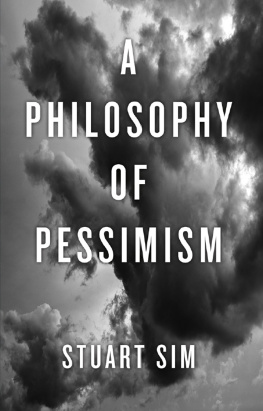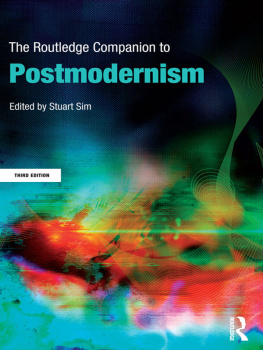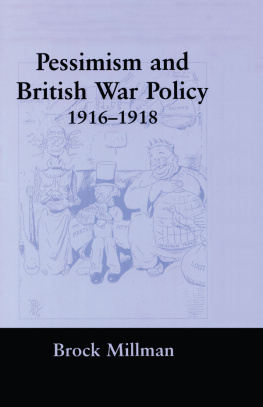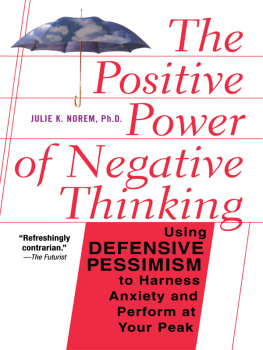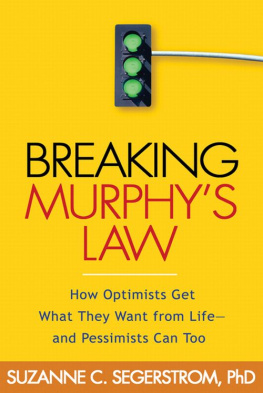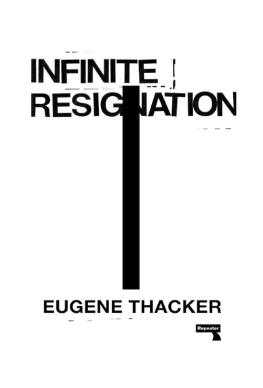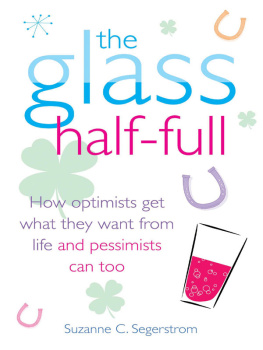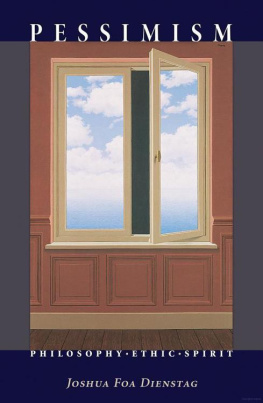Sim - A Philosophy of Pessimism
Here you can read online Sim - A Philosophy of Pessimism full text of the book (entire story) in english for free. Download pdf and epub, get meaning, cover and reviews about this ebook. City: London, year: 2015, publisher: Reaktion Books, genre: Religion. Description of the work, (preface) as well as reviews are available. Best literature library LitArk.com created for fans of good reading and offers a wide selection of genres:
Romance novel
Science fiction
Adventure
Detective
Science
History
Home and family
Prose
Art
Politics
Computer
Non-fiction
Religion
Business
Children
Humor
Choose a favorite category and find really read worthwhile books. Enjoy immersion in the world of imagination, feel the emotions of the characters or learn something new for yourself, make an fascinating discovery.
A Philosophy of Pessimism: summary, description and annotation
We offer to read an annotation, description, summary or preface (depends on what the author of the book "A Philosophy of Pessimism" wrote himself). If you haven't found the necessary information about the book — write in the comments, we will try to find it.
Sim: author's other books
Who wrote A Philosophy of Pessimism? Find out the surname, the name of the author of the book and a list of all author's works by series.
A Philosophy of Pessimism — read online for free the complete book (whole text) full work
Below is the text of the book, divided by pages. System saving the place of the last page read, allows you to conveniently read the book "A Philosophy of Pessimism" online for free, without having to search again every time where you left off. Put a bookmark, and you can go to the page where you finished reading at any time.
Font size:
Interval:
Bookmark:

A PHILOSOPHY OF PESSIMISM

REAKTION BOOKS
Dedicated to the memory of my late sister,
Fiona Cargill Sim (19472013)
Published by
Reaktion Books Ltd
33 Great Sutton Street
London EC1V 0DX, UK
www.reaktionbooks.co.uk
First published 2015
Copyright Stuart Sim 2015
All rights reserved
No part of this publication may be reproduced, stored in a retrieval system, or transmitted, in any form or by any means, electronic, mechanical, photocopying, recording or otherwise, without the prior permission of the publishers
Page references in the
Index match the printed edition of this book.
Printed and bound in Great Britain
by Bell & Bain, Glasgow
A catalogue record for this book is available from the British Library
eISBN: 9781780235509
I an Dury once had a hit song entitled Reasons To Be Cheerful (1979), which was a fairly jaunty, upbeat number; but this book is about the reasons not to be cheerful. Reasons, in fact, to be pessimistic about the human condition in general. There is no shortage of these. We can find them not just in the modern world around us, although they are numerous enough there, but throughout world history in the work of philosophers, theologians, writers, composers, thinkers and creative artists of all types. We have to wonder why pessimism has proved to have such an enduring hold over the ages, exercising so many minds, and why it seems just as relevant to us in the twenty-first century as it was in the past, despite all the undeniable improvements in the quality of life that the modern world has brought us. Why should we be pessimistic now?
Surveying its historical legacy enables us to recognize that pessimism is not just a symptom of our current cultural woes. Nor is it an abnormal state (as your friends may well keep hinting to you if you are that way inclined). Instead, it is of long standing and eminently defensible as a worldview. Furthermore, pessimism is not a message of doom and gloom but a very considered response to human nature and its full range of traits. There really are reasons not to be cheerful good ones and it is to our advantage to know what these are. Even if you think of yourself as an essentially optimistickind of person, disposed to look on the bright side of life, this knowledge should give you cause to reconsider your outlook and appreciate the virtue of twenty-first-century pessimism.
T here are many reasons to despair at the state of the world today: climate change and global warming; widespread humanitarian disasters due to war, famine and political corruption; religious intolerance and the growing influence of fundamentalist belief; political terrorism; racism; discrimination against ethnic minorities; sexism; the list could go on and on. Reflect on such phenomena at any length and it can be very difficult indeed not to become deeply pessimistic about human existence. I am one of those who do reflect, a committed pessimist, if you like, and my aim is to convince you not only that it makes sense to adopt a pessimistic attitude towards life, the universe and everything, but that we should regard pessimism as a positive condition. All of us probably swing from pessimism to optimism and back again in the daily round, but there is a very good case to be put for gravitating towards the former position in your general outlook.
If the notion of a positive pessimism sounds paradoxical, a persuasive defence can be mounted for it. Once we appreciate that there is a seam of pessimism running through our history, and that there have always been good reasons for cultivating such an outlook, we will be in a better position to understand how we can now turn it to positive account.
Philosophers, theologians, authors, creative artists in general, even scientists, have collectively contributed to a discourse of pessimism, and they have found a ready audience for theirmessage across all cultures. They have insisted that we face up to the more desperate aspects of the human condition and there are quite a few of these to ponder. How that discourse of pessimism has developed and its multi-faceted nature and, more importantly, what we can learn from it is my subject. I intend to explore the arguments for pessimism as a justifiable basis for a lifestyle, and consider why assuming that the glass is always half-empty could be of more benefit to humanity than a blinkered optimism that everything will eventually turn out all right as long as we keep faith. Even the most casual glance at human history will suggest that, on the contrary, things all too often turn out wrong sometimes horribly wrong. It seems only sensible, therefore, to cultivate a mindset that is prepared for bad outcomes to continue to be a significant part of the human experience. We need to keep the dark side of human affairs at the forefront of our consciousness, to counter the optimists and their rosy outlook. Perhaps, after all, it is more rational to adopt an essentially pessimistic attitude towards our collective lot: to wake up to reality and be a pessimist.
The word pessimism itself is derived from the Latin pessimus, meaning worst, and came into usage in the late eighteenth century; optimism comes from optimus, the Latin for best. Most current dictionary definitions of pessimism emphasize that sense of seeing the worst aspects of situations as the most likely to occur, and the working definition for this particular project will be built from that point.
It is important to note that pessimism is to be differentiated not just from optimism but also from fatalism. Pessimism involves a striving against the odds, even when you believe these are overwhelmingly stacked against you and that the worst outcome almost inevitably looms (the almost being crucial). Fatalism is more in the nature of surrendering to events that we are powerless to change. The latter is an attitude widely attributed in Western culture, rightly or wrongly, toIslamic belief. Pessimism and optimism are not necessarily mutually exclusive positions, however: pessimists can be optimistic about some things, optimists pessimistic about others in their turn. All of us are capable of the kind of mood swings in response to changing circumstances that can generate feelings of either condition at any given point in our lives, even though we might feel that we are largely disposed towards one side rather than the other. Optimists can be knocked back by severe ill health, for example, and pessimists inwardly hope to be given a clean bill of health when they visit their doctor with suspicious symptoms. It is perfectly natural to have experience of both pessimism and optimism in your own life, and this is by no means designed to be an argument that it is best to remain firmly stuck in the former state for your every waking moment.
Yet even if there is a spectrum of possible responses in any individuals life that we oscillate between, what soon becomes apparent is that each outlook has certain recurrent features that seem to point predominantly in one direction rather than the other, and that these will eventually assert themselves in attitudes and behaviour. It rarely takes long to distinguish a pessimist from an optimist, and it is the general attitude each sustains, rather than particular instances that could be interpreted either way, that will be the focus of this book. The case to be put is that pessimism should become a dominant factor in your worldview because it is a trait worth developing.
Font size:
Interval:
Bookmark:
Similar books «A Philosophy of Pessimism»
Look at similar books to A Philosophy of Pessimism. We have selected literature similar in name and meaning in the hope of providing readers with more options to find new, interesting, not yet read works.
Discussion, reviews of the book A Philosophy of Pessimism and just readers' own opinions. Leave your comments, write what you think about the work, its meaning or the main characters. Specify what exactly you liked and what you didn't like, and why you think so.

